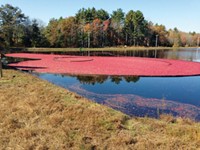Advertisement
Grab your lab coat. Let's get started
Welcome!
Welcome!
Create an account below to get 6 C&EN articles per month, receive newsletters and more - all free.
It seems this is your first time logging in online. Please enter the following information to continue.
As an ACS member you automatically get access to this site. All we need is few more details to create your reading experience.
Not you? Sign in with a different account.
Not you? Sign in with a different account.
ERROR 1
ERROR 1
ERROR 2
ERROR 2
ERROR 2
ERROR 2
ERROR 2
Password and Confirm password must match.
If you have an ACS member number, please enter it here so we can link this account to your membership. (optional)
ERROR 2
ACS values your privacy. By submitting your information, you are gaining access to C&EN and subscribing to our weekly newsletter. We use the information you provide to make your reading experience better, and we will never sell your data to third party members.
Environment
Recovering phosphorus from corn ethanol waste
Finding a way to reuse the element could help lower nutrient pollution
by Michael Torrice
March 26, 2018
| A version of this story appeared in
Volume 96, Issue 13

About 40% of the corn produced in the U.S. is used to make bioethanol. When industrial plants process corn grains to make the fuel, or even food products such as corn syrup, they generate by-products containing high levels of phosphorus, some of which end up flowing to wastewater treatment plants. Nutrients such as phosphorus and nitrogen leave these treatment plants and enter waterways, eventually flowing to bodies of water, such as the Gulf of Mexico, where they contribute to the growth of low-oxygen dead zones. Roland D. Cusick of the University of Illinois, Urbana-Champaign, and colleagues looked for economical and sustainable ways to recover the phosphorus from the by-products at corn-processing plants. At the meeting, one of Cusick’s students, Navneet Sharma, described experiments the team performed on different types of processed corn by-products. The researchers found they could precipitate organic and inorganic phosphorus compounds in minutes from the material by adding calcium and tweaking the solution’s pH. Cusick says the team must next analyze the value of the recovered phosphorus compounds and whether they can be used as fertilizer or as supplements for animal feed.





Join the conversation
Contact the reporter
Submit a Letter to the Editor for publication
Engage with us on Twitter